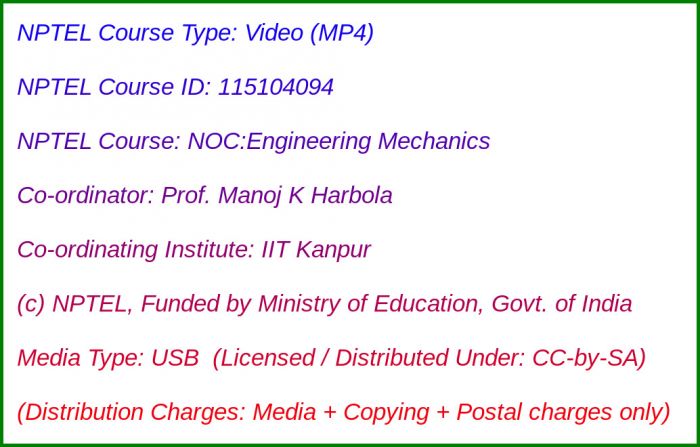
Media Storage Type : 32 GB USB Stick
NPTEL Subject Matter Expert : Prof. Manoj K Harbola
NPTEL Co-ordinating Institute : IIT Kanpur
NPTEL Lecture Count : 100
NPTEL Course Size : 3.8 GB
NPTEL PDF Text Transcription : Available and Included
NPTEL Subtitle Transcription : Available and Included (SRT)
Lecture Titles:
Lecture 1 - Introduction to Vectors
Lecture 2 - Addition and subtraction of vectors
Lecture 3 - Multiplying vectors
Lecture 4 - Introduction to vectors: solved examples - I
Lecture 5 - Transformation of vectors under rotation
Lecture 6 - Vector products and their geometric interpretation
Lecture 7 - Vector Product: Kronecker Delta and Levi-Civita symbols - I
Lecture 8 - Vector Product: Kronecker Delta and Levi-Civita symbols - II
Lecture 9 - Introduction to vectors: solved examples - II
Lecture 10 - Equilibrium of rigid bodies – Forces and torques
Lecture 11 - Calculating torques and couple moments - I
Lecture 12 - Calculating torques and couple moments - II
Lecture 13 - Finding a force and a couple equivalent to an applied force
Lecture 14 - Different elements and associated forces and torques - I
Lecture 15 - Different elements and associated forces and torques - II
Lecture 16 - Solved examples; equilibrium of bodies – I
Lecture 17 - Solved examples; equilibrium of bodies – II
Lecture 18 - Forces in different geometric configuration
Lecture 19 - Plane trusses I - building a truss and condition for it to be statically determinate
Lecture 20 - Plane trusses II - calculating forces in a simple truss and different types of trusses
Lecture 21 - Plane trusses III - calculating forces in a simple truss by method of joints
Lecture 22 - Plane trusses IV- Solved examples for calculating forces in a simple truss by method of joints
Lecture 23 - Plane trusses V - Solved examples for calculating forces in a simple truss by method of joints
Lecture 24 - Plane trusses VI - method of sections for calculating forces in a simple truss
Lecture 25 - Dry friction I - introduction with an example
Lecture 26 - Dry friction II - a solved example
Lecture 27 - Dry friction III - Dry thrust bearing and belt friction with demonstration
Lecture 28 - Dry friction IV - Screw friction and rolling friction
Lecture 29 - Dry friction V - Solved examples
Lecture 30 - Properties of plane surfaces I - First moment and centroid of an area
Lecture 31 - Properties of plane surfaces II - Centroid of an area made by joining several plane surfaces
Lecture 32 - Properties of plane surfaces III - Centroid of a distributed force and its relation with centre of gravity
Lecture 33 - Properties of plane surfaces IV - solved examples of calculation of first moment and centroid of distributed forces
Lecture 34 - Properties of plane surfaces V- Second moment and product of an area and radius of gyration
Lecture 35 - Properties of plane surfaces VI - Parallel axis transfer theorem for second moment and product of an area
Lecture 36 - Properties of plane surfaces VII - transformation of second moment and product of an area under rotation of coordinate axes
Lecture 37 - Properties of plane surfaces VIII - second moment and product of an area, solved examples
Lecture 38 - Method of virtual work I - degrees of freedom, constraints and constraint forces
Lecture 39 - Method of virtual work II - virtual displacement, virtual work and equilibrium condition in terms of virtual work
Lecture 40 - Method of virtual work III - solved examples
Lecture 41 - Motion of a particle in a plane in terms of planar polar coordinates
Lecture 42 - Planar polar coordinates: solved examples
Lecture 43 - Description of motion in cylindrical and spherical coordinate systems
Lecture 44 - Using planar polar, cylindrical and spherical coordinate systems: solved examples
Lecture 45 - Motion with constraints, constraint forces and free body diagram
Lecture 46 - Motion with constraints – solved examples
Lecture 47 - Motion with dry friction – solved examples
Lecture 48 - Motion with drag – solved examples
Lecture 49 - Equation of motion in terms of linear momentum and the principle of conservation of linear momentum
Lecture 50 - Linear momentum and centre of mass
Lecture 51 - Momentum transfer, impulse and force due to a stream of particles hitting an object
Lecture 52 - Momentum and the variable mass problem
Lecture 53 - Linear momentum – solved examples
Lecture 54 - Work and energy I - work energy theorem; conservative and non-conservative force fields
Lecture 55 - Work and energy II - Definition of potential energy for conservative forces; total mechanical energy and the principle of conservation of energy
Lecture 56 - Work and energy III - Two solved examples using conservation principles
Lecture 57 - Work and energy IV – Further discussion on potential energy
Lecture 58 - Work and energy V - Solved examples
Lecture 59 - Work and energy VI – Applying conservation principles to solve a collision problem
Lecture 60 - Work and energy VII - Solved examples
Lecture 61 - Rigid body motion I - degrees of freedom and number of variables required to describe motion of a rigid body
Lecture 62 - Rigid body motion II - Equation of motion for a single particle in terms of angular momentum and torque; motion of a conical pendulum
Lecture 63 - Rigid body motion III - Conservation of angular momentum; angular momentum for a collection of particles
Lecture 64 - Rigid body motion IV - applying angular momentum conservation, a solved example
Lecture 65 - Rigid body motion V (fixed axis rotation) - some demonstrations of conservation of angular momentum about fixed axis
Lecture 66 - Rigid body motion VI (fixed axis rotation) - Some more demonstrations and related problems
Lecture 67 - Rigid body motion VII (fixed axis rotation) - Kinetic energy and moment of inertia for fixed axis rotation and some solved examples
Lecture 68 - Rigid body motion VIII (fixed axis rotation) - solved examples for calculating moment of inertia and conservation of angular momentum
Lecture 69 - Rigid body motion IX (fixed axis rotation) - solved examples
Lecture 70 - Rigid body motion X - rotation and translation with axis moving parallel to itself
Lecture 71 - Rigid body motion XI - solved examples for rotation and translation with axis moving parallel to itself
Lecture 72 - Rigid-body dynamics XII - Some demonstrations on general motion of rigid bodies
Lecture 73 - Rigid-body dynamics XIII - Infinitesimal angles as vector quantities and change of a vector when rotated by an infinitesimal angle
Lecture 74 - Rigid-body dynamics XIV - Angular velocity and the rate of change of a rotating vector; relating change in angular velocity to an applied torque
Lecture 75 - Rigid-body dynamics XV - Relationship between angular momentum and angular velocity – the moment of inertia tensor and the principal axes
Lecture 76 - Rigid-body dynamics XVI - Solved examples
Lecture 77 - Rigid body motion XVII – A review of the relation between angular momentum and angular velocity, moment of inertia tensor and the principal axes Edit Lesson
Lecture 78 - Rigid body motion XVIII- Solved examples for calculating rate of change of angular momentum and torque when angular velocity and angular momentum are not parallel
Lecture 79 - Rigid body dynamics XIX - understanding demonstrations shown earlier using equation of motion
Lecture 80 - Rigid body dynamics XX - understanding demonstrations shown earlier using equation of motion (Euler equations)
Lecture 81 - Rigid body dynamics XXI - Euler equations, solved examples
Lecture 82 - Simple harmonic motion I - expanding potential energy about the equilibrium point and the corresponding force
Lecture 83 - Simple harmonic motion II - solving the equation of motion with given initial conditions
Lecture 84 - Simple harmonic motion III - solved examples
Lecture 85 - Simple harmonic motion IV - representing simple harmonic motion on a phasor diagram; energy of an oscillator
Lecture 86 - Simple harmonic motion V - solved examples
Lecture 87 - Simple harmonic motion VI - solving the equation of motion with constant friction in the system
Lecture 88 - Simple harmonic motion VII - harmonic oscillator with velocity-dependent damping (heavy damping)
Lecture 89 - Simple harmonic motion VIII - harmonic oscillator with velocity-dependent damping (critical damping)
Lecture 90 - Simple harmonic motion IX - solved examples
Lecture 91 - Simple harmonic motion X - harmonic oscillator with velocity-dependent damping (light damping)
Lecture 92 - Simple harmonic motion XI - solved examples
Lecture 93 - Simple harmonic motion XII - oscillations of an un-damped harmonic oscillator subjected to an oscillatory force
Lecture 94 - Simple harmonic motion XIII - oscillations of a forced damped harmonic oscillator - I
Lecture 95 - Simple harmonic oscillator XIV - oscillations of a forced damped harmonic oscillator - II
Lecture 96 - Simple harmonic oscillator XV - Energy and power in a forced damped harmonic oscillator
Lecture 97 - Simple harmonic oscillator XVI - Solved examples
Lecture 98 - Equation of motion in a uniformly accelerating frame
Lecture 99 - Motion described in a uniformly accelerating frame; solved examples - I
Lecture 100 - Motion described in a uniformly accelerating frame; solved examples - II

